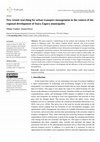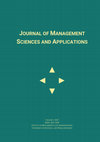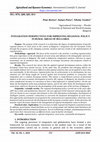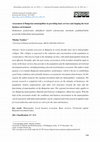Regional Development by Nikolay I Tsonkov

Public Policy and Administration Journal , 2024
In recent years, the digitalization of the economy and the increasing demand for resources have c... more In recent years, the digitalization of the economy and the increasing demand for resources have created several challenges for developing countries, their regions, and urban agglomerations. Therefore, many governments have undertaken significant changes in the policies applied to developing regions and cities. These new concepts are aimed at gradually building sustainable and smart cities. This is the response of countries to new challenges such as the digital environment, combating climate change, and maintaining favorable living conditions due to the strong environmental and socioeconomic degradation. In this regard, the authors set as their main research objective to analyze and assess the sustainability of cities and the surrounding territory by implementing sustainable development policies at all levels. A major task and difficulty for the authors is to build upon and refine a model that can be used to assess sustainable and smart cities. In this paper, the authors propose an approach to studying sustainable cities, thus evaluating the effects of policies implemented in this field. The model includes the main groups of indicators that are used to analyze the sustainable and smart development of municipalities in the Northeast region of Bulgaria. Based on these indicators, data is collected, and processed, and comparative and statistical analysis is carried out to assess their sustainability and intelligence. The authors reach important conclusions such as an unsatisfactory level of sustainable and intelligent development, although the environment and conditions at the national level are favorable. In fact, in Bulgaria, based on the assessment of the studied municipalities in the Northeast region, it is clear that we cannot talk about sustainable cities because Bulgarian municipalities are still at the beginning of this development path.

New trends searching for urban transport management in the context of the regional development of Stara Zagora municipality, 2024
The paper proposes a methodology for the analysis and evaluation of the traffic scheme of Bulgari... more The paper proposes a methodology for the analysis and evaluation of the traffic scheme of Bulgarian cities. The authors combine spatial, network, and socioeconomic analyses of cities with transport operators' financial-economic evaluation, sociological studies of transport habits, and the possibilities of new information technologies for transport modeling (such as geographic information systems). The model proposes several approaches to optimize the municipality's transport scheme. It results from a new need to improve urban traffic, the quality of transport services, and the integration of urban transport into the regional economy of Stara Zagora municipality. It presents a description, analysis, and outline of the opportunities for developing urban transport connectivity and mobility in Stara Zagora municipality. The research results show a deficit of transport connectivity between the different parts of the city, reflecting on the regional economy's development and the efficiency of the environment and the population.

KEY ASPECTS OF STRATEGIC INFRASTRUCTURE DEVELOPMENT, 2024
The strategic infrastructure is the backbone of every transport network. The development in the l... more The strategic infrastructure is the backbone of every transport network. The development in the last several years changed its course following the geopolitical situation and the enormous growth of electrical and self-driving cars. It is no longer enough to connect borders, we need to connect them in a certain way to ensure that the transport from one country will not face difficulties to the final point. For example, in the current situation if we travel between the farthest points in Europe we will cross different roads, with different characteristics and different rules, but we will reach the final point. If we consider traveling with the electric car it will be impossible as we will need a charging station every few hundred kilometres. To meet society's needs we need to reorganize the ways we are thinking of the strategic infrastructure.

NEED FOR CHANGE IN THE SYSTEM OF TERRITORIAL-ADMINISTRATIVE PLANNING AND PLANNING DISTRICTS OVERVIEW OF THE REGIONAL DEVELOPMENT OF BULGARIA, 2024
The administrative and territorial structure of the Bulgarian state is inextricably linked to geo... more The administrative and territorial structure of the Bulgarian state is inextricably linked to geographical, economic, demo-
graphic, socio-economic, and transport peculiarities and administrative traditions. The territorial organization determines
the regional specialization of the national economy. On the other hand, the regional structure of the country determines
the implementation of regional policy and the balanced territorial development of the regions. Bulgaria's territorial and
administrative units, such as districts and municipalities, are also subject to regional policy. After the country acceded to
the EU, planning regions were introduced, linked to the districts and the regional demographic development. All these
factors lead to the relevance and necessity of changes in the administrative-territorial structure of Bulgaria. This paper anal-
yses the actual and proposed changes in territorial planning. The author examines the administrative-territorial structure
of Bulgaria in the context of the new socio-economic and demographic realities. They change the municipalities, which
in these new conditions do not perform their functions or provide basic services (educational, infrastructural, administra-
tive, social, health, etc.). The findings presented are supported by statistical data and the results of a sociological survey
conducted by the author. The author analyses the possibilities of changes in the planning areas, which will eventually
lead to changes in the territorial organization of the districts. These changes should be linked to the completion of the
decentralization process and the actual introduction of a second level of government, also enshrined in the Constitution
of the Republic of Bulgaria.

Vol. 1 (2022): Journal of Management Sciences and Applications, 2022
Journal of Management Sciences and Applications (JOMSA) is an electronic journal of the Faculty o... more Journal of Management Sciences and Applications (JOMSA) is an electronic journal of the Faculty of Management and Administration at the University of National and World Economy - Sofia, Bulgaria.
The journal is committed to publishing scientific empirical and theoretical research articles that have a major impact on governance, administration, regional development and marketing. The journal encourages new ideas or perspectives on existing research. The publications are published twice a year in November and May.
The journal publishes a wide range of topics in the fields of Management sciences, Strategic planning, Methodological research and Theoretical paradigms. Manuscripts that are suitable for publication in the Journal of Management Sciences and Applications may also include Regional policy, Entrepreneurship, Human resource management, Organizational behavior, Organizational theory and Earth sciences. Our task is the Journal of Management Sciences and Applications (JOMSA) to publish scientific empirical, theoretical and review articles of young scientists and distinguished specialists working in the field of Management and Administration around the world.

Journal of Management Sciences and Applications , 2023
Journal of Management Sciences and Applications (JOMSA) is an electronic journal of the Faculty o... more Journal of Management Sciences and Applications (JOMSA) is an electronic journal of the Faculty of Management and Administration at the University of National and World Economy - Sofia, Bulgaria.
The journal is committed to publishing scientific empirical and theoretical research articles that have a major impact on governance, administration, regional development and marketing. The journal encourages new ideas or perspectives on existing research. The publications are published twice a year in November and May.
The journal publishes a wide range of topics in the fields of Management sciences, Strategic planning, Methodological research and Theoretical paradigms. Manuscripts that are suitable for publication in the Journal of Management Sciences and Applications may also include Regional policy, Entrepreneurship, Human resource management, Organizational behavior, Organizational theory and Earth sciences. Our task is the Journal of Management Sciences and Applications (JOMSA) to publish scientific empirical, theoretical and review articles of young scientists and distinguished specialists working in the field of Management and Administration around the world.

Journal of Management Sciences and Applications (JOMSA) is an electronic journal of the Faculty of Management and Administration at the University of National and World Economy - Sofia, Bulgaria. The journal is committed to publishing scientific empirical and theoretical research articles that h..., 2022
Journal of Management Sciences and Applications (JOMSA) is an electronic journal of the Faculty o... more Journal of Management Sciences and Applications (JOMSA) is an electronic journal of the Faculty of Management and Administration at the University of National and World Economy - Sofia, Bulgaria.
The journal is committed to publishing scientific empirical and theoretical research articles that have a major impact on governance, administration, regional development and marketing. The journal encourages new ideas or perspectives on existing research. The publications are published twice a year in November and May.
The journal publishes a wide range of topics in the fields of Management sciences, Strategic planning, Methodological research and Theoretical paradigms. Manuscripts that are suitable for publication in the Journal of Management Sciences and Applications may also include Regional policy, Entrepreneurship, Human resource management, Organizational behavior, Organizational theory and Earth sciences. Our task is the Journal of Management Sciences and Applications (JOMSA) to publish scientific empirical, theoretical and review articles of young scientists and distinguished specialists working in the field of Management and Administration around the world.
Journal of Management Sciences and Applications, 2024
The journal is committed to publishing scientific empirical and theoretical research articles tha... more The journal is committed to publishing scientific empirical and theoretical research articles that have a major impact on governance, administration, regional development and marketing. The journal encourages new ideas or perspectives on existing research. The publications are published twice a year in December and June. The journal publishes a wide range of topics in the fields of Management sciences, Strategic planning, Methodological research and Theoretical paradigms. Manuscripts that are suitable for publication in the Journal of Management Sciences and Applications may also include Regional policy, Entrepreneurship, Human resource management, Organizational behaviour, Organizational theory and Earth sciences.

Dynamics in the Regional Development of Municipalities with a Population Between 10 and 30 Thousand in Eastern Bulgaria, 2023
The Black Sea region is an economic, trade, transport, energy, geostrategic and political crossro... more The Black Sea region is an economic, trade, transport, energy, geostrategic and political crossroads. The interests of the European Union, the United States, Russia, China, Turkey, and the Balkan countries are intertwined here. Over the decades, several initiatives have been organized to satisfy the interests of global and regional players and to improve the economic, environmental, social, and transport situation, including connectivity through the construction of strategic transport infrastructure (regional and interregional). The analysis of past policies concludes that a high degree of coherence, coordination, and implementation of a strategic approach to solving regional problems and creating integrity, connectivity, and regional connectivity has not yet been achieved. Within the Bulgarian Black Sea coast and looking at the wider context, there is no successful cooperation and economic interconnection between the municipalities on and near the sea. This is done through regional connectivity, building strategic transport infrastructure, and intermodal transport. The above argues for the need to plan and develop the Black Sea region in Bulgaria considering it in a broader context of strategic transport infrastructure development. It is the basis for the subsequent improvement of connectivity, economic links, and socio-economic development, including in this part of the Bulgarian territory. The relevance of the research stems from the contemporary processes in the Black Sea region. These processes are related to increasing tensions and strengthening a wide range of interests in inland sea control.
GIS-based model for the assessment of the smart sustainable development of municipalities of Northeast Bulgaria, 2023
In recent years, Bulgarian municipalities have introduced smart development systems. The Bulgaria... more In recent years, Bulgarian municipalities have introduced smart development systems. The Bulgarian state is at the top of the world rankings regarding household internet access and connection speed. The authors develop and validate a GIS-based model for the analysis and evaluation of sustainable cities. The authors conclude that in a global digital economy and society, Bulgarian regions need to improve the accessibility of WI-FI networks to meet the challenges of Smart Development. In recent years, the authors have observed a growth of Smart Cities initiatives in large areas of Northeast Bulgaria. However, Bulgarian municipalities in the study area are lagging in deploying smart governance systems.

On the need for connectivity and a new strategic approach to building road infrastructure in the Balkans, 2023
The Bulgarian state is characterized by its geostrategic location. However, the country has not t... more The Bulgarian state is characterized by its geostrategic location. However, the country has not taken advantage of its natural localization. The main reasons for this are the lack of strategic thinking and implementation of a targeted and active transport policy within Bulgaria and the Balkans. This policy includes the planning and realization of projects in the field of strategic infrastructure. The policy is adopted in the context of the trans-European transport corridors. This will create conditions for connectivity between Bulgarian regions and conditions for stimulating cross-border cooperation. In this direction, the authors analyze the transport sector and infrastructure in Bulgaria to highlight the important areas where the Bulgarian state needs to take urgent action. In this regard, it is necessary to formulate the major priorities that will take place in a new strategy for the transport sector. The strategy is related to the reconducting of political activities, measures, and acceleration of the investments in Bulgaria's strategic road infrastructure.

Possibilities for the construction of a parallel route of the European transport corridor No 9 through Romania, Bulgaria, and Greece , 2023
The Bulgarian state is significantly behind in the development of its strategic road infrastructu... more The Bulgarian state is significantly behind in the development of its strategic road infrastructure. This circumstance is complemented by the deteriorated state of the already-built infrastructure in the Bulgarian state. There is a need to change the policy philosophy for managing and maintaining the strategic infrastructure in Bulgaria. It is necessary to strongly link this policy with the regional development policy, due to the similar objectives they must achieve. They are aimed at bringing Bulgarian regions closer together, and their economic and regional development based on improved connectivity between them. Achieving all this, however, is hampered by a significant deficit in the system. There is a lack of connectivity and development of the transport axes in the North-South direction. In this regard, the authors set as their main objective to analyze and assess the possibilities for the construction of a parallel route of the European transport corridor No. 9 through Romania, Bulgaria, and Greece, which includes the construction of a tunnel between the town of Troyan and the village of Karnare in the central part of the Balkan Mountains. The implementation of this project will bring economic, social, transport, and financial benefits to the Bulgarian state. The construction of the project ensures connectivity between the Balkan countries, the formation of a single European market, stimulating the development of Northern Bulgaria, and a targeted impact on the North and South-Central planning regions.

TRANSPORT DEVELOPMENT OPPORTUNITIES IN THE RURAL AREAS OF THE STARA ZAGORA URBAN AREA IN BULGARIA, 2023
The paper explores the possibility of transport development as a factor for the rural integration... more The paper explores the possibility of transport development as a factor for the rural integration of a population of over 100,000 using the example of the city of Stara Zagora in Bulgaria. The analysis showed that improving the access of the rural population to the agglomeration areas can be done through the combination of inter-urban transport that connects the villages with the nearby city The purpose of developing this process is to increase the access of the rural population to the cities and, accordingly, to bring out the problems that the people of the villages have in terms of urban transport. Based on a proposed methodology, we propose to highlight the main public transport problems of the rural population. On the other hand, to propose different views and models to achieve higher efficiency of urban transport and its implementation in rural areas. In this paper, quantitative and qualitative analysis is used and the results are also used to assess the impact of price fluctuations on vegetable marketing channels including vegetable processing enterprises. Data on vegetable prices were extracted from the tempo on line database and the analysis was also based on interviews with key stakeholders in the vegetable processing chain. The results reveal a high coefficient of variation at the farm gate stage, which is also transmitted to the distribution and commercialization stage. The analysis was also carried out at the processing level and the results also show a rather high coefficient of variation.

Integration perspectives for improving regional policy in rural areas of Bulgaria, 2024
Purpose. The purpose of the research is to determine the degree of implementation of specific reg... more Purpose. The purpose of the research is to determine the degree of implementation of specific regional policies in rural areas in the context of Bulgaria's integration into the European Union through the prospects of the changing economic situation and new trends in the implementation of regional policy. Methodology / approach. The focus of the research is the need for a working regional policy that gives importance to the development of rural areas and influences the demographic and socioeconomic processes in Bulgaria. The study is defined by comparative analysis, reference to expert assessment, use of statistical data, and analysis of strategic documents and programs related to regional development. Results. This research has shown that the applied regional development policies within the European Union have partial success. At the same time, the problems and emerging deficits are successfully defined, but it is more difficult to find optimal solutions that can be applied in more than one municipality. In this direction, regional policy has its achievements in its development, but new solutions are still being sought for several spatial and territorial problems in connection with integration into a common European market. This means a comprehensive process of functional impacts in the socioeconomic development of nearly 281 regions. In Bulgaria, the situation is even more complicated, because it is necessary to have a dual approach in regional politics. On the one hand, the development of the most urbanised regions, and on the other hand, the development of the rural areas, which are decisive for the development of the greater part of the territory of Bulgaria. Originality / scientific novelty. The regional development policy carried out in the years after 2007 has a static and spontaneous character, the new approach of the measures and programs after 2023 are based on new concepts and elements in line with information technologies, development of intelligent systems, economic connectivity to overcome the backward development of rural areas. New approaches and moments are proposed in the construction of a regional policy, which has a new framework and provisions for the development of the European economic space. In this direction, the need for expert decisions related to the management of regional development comes to the fore. Practical value / implications. It is necessary to make regional development a national priority. In addition, governments should facilitate access to young people and medium-sized businesses for the use of inputs and the promotion of projects. Access to financing, strategic, and planning activities, which have their characteristics at different levels, must be further developed.
ASSESSMENT OF REGIONAL DISPARITIES AND DYNAMICS OF MUNICIPALITIES WITH A POPULATION FROM 10,000 TO 30,000 IN EASTERN BULGARIA, 2024
The journal is registered and published in Czech Republic.
GIS-BASED MODEL FOR THE ASSESSMENT OF THE SMART SUSTAINABLE DEVELOPMENT OF THE MUNICIPALITIES OF NORTHEAST BULGARIA, Dec 1, 2023
In recent years, Bulgarian municipalities have introduced smart development systems. The Bulgaria... more In recent years, Bulgarian municipalities have introduced smart development systems. The Bulgarian state is at the top of the world rankings regarding household internet access and connection speed. The authors develop and validate a GIS-based model for the analysis and evaluation of sustainable cities. The authors conclude that in a global digital economy and society, Bulgarian regions need to improve the accessibility of WI-FI networks to meet the challenges of Smart Development. In recent years, the authors have observed a growth of Smart Cities initiatives in large areas of Northeast Bulgaria. However, Bulgarian municipalities in the study area are lagging in deploying smart governance systems.

ANALYSIS OF THE DEVELOPMENT OF INTELLIGENT TRANSPORT SYSTEMS IN THE LARGEST CITIES IN BULGARIA, 2023
In this paper, we analyze the development of intelligent transport systems in the largest cities ... more In this paper, we analyze the development of intelligent transport systems in the largest cities in Bulgaria. The focus is on the possibility to implement new information technologies and smart solutions to improve the urban environment. In this direction, a brief analysis of smart proposals or features of regional development in the context of information technology development is presented. Solutions and visions are proposed to take into account the particularities of the urban development of urban systems. The necessity of the practical application of information technologies in the development of territorial systems is also highlighted. Intelligent transport systems are characterized and the opportunities they provide for increasing the quality of transport service and improving the lives of the population, especially in urban settings. Intelligent systems use a mechanism to analyze their environment, as a result of which, they initiate actions to achieve predefined goals.

Assessment of Bulgarian municipalities in providing basic services and shaping the local business environment, 2023
Socioeconomic processes in Bulgaria in recent decades have led to demographic collapse. This coll... more Socioeconomic processes in Bulgaria in recent decades have led to demographic collapse. This collapse is expressed in the reduction and concentration of the population in certain places. This process leads to the shrinkage of cities, with small municipalities being the most affected. Normally, after the next census, an inventory of the localities should be made in terms of the basic services they provide to the population and the implementation of territorial development policies, including forming a favorite local business ecosystem. The author's main purpose is to evaluate Bulgarian municipalities' performance, which is the key to establishing good living conditions and a friendly business ecosystem for investment attractiveness. In this regard, the author proposes the regional investment index for municipalities' evaluation. The present research is completed with a sociological survey on the attitudes of businesses, the population, branch organizations, and other civil structures towards the state and the functioning of municipalities in the Bulgarian state. The regional investment index applies to two Bulgarian municipalities (Balchik and Pomorie) in Bulgaria's Black Sea region. With the help of the assessment model, the conditions and business environment in the municipalities can be measured, individual municipalities can be compared and it has practical-applied value for local authorities and citizens as well as for the state and business.
INTELLIGENT DEVELOPMENT AND CONNECTEDNESS IN THE CONTEXT OF THE REGIONAL DEVELOPMENT, 2022
At present spatial development, the focus of the research, is directed to the regions' developmen... more At present spatial development, the focus of the research, is directed to the regions' development and establishing competitive environment of their territory. In this exposition the authors explore innovations and their influence on regional development improvement. The purpose of the research is the potential of the investment policies and innovative environment for creating terms of life quality increasing in regions. The authors try to create a methodology for enforcing the process of the regions' intelligent development. The authors outline the tendencies related to regional intelligent development and influence on national territory development.
Security and Defense, 2022
Nations do not trust each other because they are armed, and they are
armed because they do not t... more Nations do not trust each other because they are armed, and they are
armed because they do not trust each other. The security dilemma is a major problem of
the international state system, which is a result of its "anarchic" structure. Lack of trust
is the main thing that brings uncertainty and stress and turns mutual fears and suspicions
into a self-fulfilling prophecy. Every country needs sufficient and well-trained human
resources to enhance its national security. Education must provide the appropriate
competencies in every aspect of the national security









Uploads
Regional Development by Nikolay I Tsonkov
graphic, socio-economic, and transport peculiarities and administrative traditions. The territorial organization determines
the regional specialization of the national economy. On the other hand, the regional structure of the country determines
the implementation of regional policy and the balanced territorial development of the regions. Bulgaria's territorial and
administrative units, such as districts and municipalities, are also subject to regional policy. After the country acceded to
the EU, planning regions were introduced, linked to the districts and the regional demographic development. All these
factors lead to the relevance and necessity of changes in the administrative-territorial structure of Bulgaria. This paper anal-
yses the actual and proposed changes in territorial planning. The author examines the administrative-territorial structure
of Bulgaria in the context of the new socio-economic and demographic realities. They change the municipalities, which
in these new conditions do not perform their functions or provide basic services (educational, infrastructural, administra-
tive, social, health, etc.). The findings presented are supported by statistical data and the results of a sociological survey
conducted by the author. The author analyses the possibilities of changes in the planning areas, which will eventually
lead to changes in the territorial organization of the districts. These changes should be linked to the completion of the
decentralization process and the actual introduction of a second level of government, also enshrined in the Constitution
of the Republic of Bulgaria.
The journal is committed to publishing scientific empirical and theoretical research articles that have a major impact on governance, administration, regional development and marketing. The journal encourages new ideas or perspectives on existing research. The publications are published twice a year in November and May.
The journal publishes a wide range of topics in the fields of Management sciences, Strategic planning, Methodological research and Theoretical paradigms. Manuscripts that are suitable for publication in the Journal of Management Sciences and Applications may also include Regional policy, Entrepreneurship, Human resource management, Organizational behavior, Organizational theory and Earth sciences. Our task is the Journal of Management Sciences and Applications (JOMSA) to publish scientific empirical, theoretical and review articles of young scientists and distinguished specialists working in the field of Management and Administration around the world.
The journal is committed to publishing scientific empirical and theoretical research articles that have a major impact on governance, administration, regional development and marketing. The journal encourages new ideas or perspectives on existing research. The publications are published twice a year in November and May.
The journal publishes a wide range of topics in the fields of Management sciences, Strategic planning, Methodological research and Theoretical paradigms. Manuscripts that are suitable for publication in the Journal of Management Sciences and Applications may also include Regional policy, Entrepreneurship, Human resource management, Organizational behavior, Organizational theory and Earth sciences. Our task is the Journal of Management Sciences and Applications (JOMSA) to publish scientific empirical, theoretical and review articles of young scientists and distinguished specialists working in the field of Management and Administration around the world.
The journal is committed to publishing scientific empirical and theoretical research articles that have a major impact on governance, administration, regional development and marketing. The journal encourages new ideas or perspectives on existing research. The publications are published twice a year in November and May.
The journal publishes a wide range of topics in the fields of Management sciences, Strategic planning, Methodological research and Theoretical paradigms. Manuscripts that are suitable for publication in the Journal of Management Sciences and Applications may also include Regional policy, Entrepreneurship, Human resource management, Organizational behavior, Organizational theory and Earth sciences. Our task is the Journal of Management Sciences and Applications (JOMSA) to publish scientific empirical, theoretical and review articles of young scientists and distinguished specialists working in the field of Management and Administration around the world.
armed because they do not trust each other. The security dilemma is a major problem of
the international state system, which is a result of its "anarchic" structure. Lack of trust
is the main thing that brings uncertainty and stress and turns mutual fears and suspicions
into a self-fulfilling prophecy. Every country needs sufficient and well-trained human
resources to enhance its national security. Education must provide the appropriate
competencies in every aspect of the national security
graphic, socio-economic, and transport peculiarities and administrative traditions. The territorial organization determines
the regional specialization of the national economy. On the other hand, the regional structure of the country determines
the implementation of regional policy and the balanced territorial development of the regions. Bulgaria's territorial and
administrative units, such as districts and municipalities, are also subject to regional policy. After the country acceded to
the EU, planning regions were introduced, linked to the districts and the regional demographic development. All these
factors lead to the relevance and necessity of changes in the administrative-territorial structure of Bulgaria. This paper anal-
yses the actual and proposed changes in territorial planning. The author examines the administrative-territorial structure
of Bulgaria in the context of the new socio-economic and demographic realities. They change the municipalities, which
in these new conditions do not perform their functions or provide basic services (educational, infrastructural, administra-
tive, social, health, etc.). The findings presented are supported by statistical data and the results of a sociological survey
conducted by the author. The author analyses the possibilities of changes in the planning areas, which will eventually
lead to changes in the territorial organization of the districts. These changes should be linked to the completion of the
decentralization process and the actual introduction of a second level of government, also enshrined in the Constitution
of the Republic of Bulgaria.
The journal is committed to publishing scientific empirical and theoretical research articles that have a major impact on governance, administration, regional development and marketing. The journal encourages new ideas or perspectives on existing research. The publications are published twice a year in November and May.
The journal publishes a wide range of topics in the fields of Management sciences, Strategic planning, Methodological research and Theoretical paradigms. Manuscripts that are suitable for publication in the Journal of Management Sciences and Applications may also include Regional policy, Entrepreneurship, Human resource management, Organizational behavior, Organizational theory and Earth sciences. Our task is the Journal of Management Sciences and Applications (JOMSA) to publish scientific empirical, theoretical and review articles of young scientists and distinguished specialists working in the field of Management and Administration around the world.
The journal is committed to publishing scientific empirical and theoretical research articles that have a major impact on governance, administration, regional development and marketing. The journal encourages new ideas or perspectives on existing research. The publications are published twice a year in November and May.
The journal publishes a wide range of topics in the fields of Management sciences, Strategic planning, Methodological research and Theoretical paradigms. Manuscripts that are suitable for publication in the Journal of Management Sciences and Applications may also include Regional policy, Entrepreneurship, Human resource management, Organizational behavior, Organizational theory and Earth sciences. Our task is the Journal of Management Sciences and Applications (JOMSA) to publish scientific empirical, theoretical and review articles of young scientists and distinguished specialists working in the field of Management and Administration around the world.
The journal is committed to publishing scientific empirical and theoretical research articles that have a major impact on governance, administration, regional development and marketing. The journal encourages new ideas or perspectives on existing research. The publications are published twice a year in November and May.
The journal publishes a wide range of topics in the fields of Management sciences, Strategic planning, Methodological research and Theoretical paradigms. Manuscripts that are suitable for publication in the Journal of Management Sciences and Applications may also include Regional policy, Entrepreneurship, Human resource management, Organizational behavior, Organizational theory and Earth sciences. Our task is the Journal of Management Sciences and Applications (JOMSA) to publish scientific empirical, theoretical and review articles of young scientists and distinguished specialists working in the field of Management and Administration around the world.
armed because they do not trust each other. The security dilemma is a major problem of
the international state system, which is a result of its "anarchic" structure. Lack of trust
is the main thing that brings uncertainty and stress and turns mutual fears and suspicions
into a self-fulfilling prophecy. Every country needs sufficient and well-trained human
resources to enhance its national security. Education must provide the appropriate
competencies in every aspect of the national security
несигурност, нестабилност, непредсказуемост и постоянни преходи към различни
по вид кризи. В подобна ситуация, дейността по гарантиране на националната
сигурност, посредством ефективно управление на кризи, става все по-важно и
приоритетно за държавата. За съжаление, анализите на състоянието и
предизвикателствата пред българската система за национална сигурност
показват критично ниво, породено от различни по характер и интензитет
обективни и субективни характеристики на икономическата, обществена и
административно-управленска система на държавата. Авторът си поставя за
цел да установи връзката на управлението на кризи и състоянието на
сигурността в България, и на тази основа да формулира възможностите за
преодоляване на дефицитите на системата на национална сигурност. Авторът
достига до изводите, че е необходимо да бъде формулирана национална доктрина
за дългосрочно развитие на българската държава и нова Стратегия за
национална сигурност на Р България.
It is stated that security requires a detailed analysis due to the changes in the structure of the international system. We are seeing an increase in military conflicts in different parts of the world. Both migratory pressure and the terrorist threat to the European continent are increasing. As a result of these processes, uncertainty has become an essential feature of the international system and economy. Political and economic opposition between individual major players is growing, which predetermines a high degree of uncertainty regarding the predictability of international relations. This circumstance calls into question the stability, reliability and security of the system of international relations.
In this regard, national security is closely linked to the security and preservation of the socio-political system of a country with other countries in the pursuit of national goals and interests, and thus enters into interstate relations that may facilitate or hinder the implementation of the goals.
governance in the system of Defense ministry of Bulgaria. The result is that the
electronic services are missing. In fact the administrative body does not take
advantage of European programs in Bulgaria. And by this way it may improve
the Ministry public services provision. In the report Central military command
(CMC) project that was approved for implementation are introduced. The main
goal of this project is though documents’ scanning and digitalization to build
electronic data base. The second stage is related to electronic services
implementation. It is important to underline that the project will be extended to
the national level because it will include the eight structures of the CMC which
provides nine public services. By realizing this project it will achieve CMC
public services structure optimization and improving of interaction between
CMC, citizens and other administrative bodies.
development according to electronic management adoption in public sector. The
author researches the system in three directions – electronic services in the
Ministry of Regional development and Facilitation, information system for
regional development building and geography information system adoption in
municipalities. The author analyses the normative documents in regard to
regional development. The main purpose of this survey is to give a real situation
of regional development electronic system and reveal weaknesses and
challenges against electronic management adoption in regional development
system.
continue. Analysis shows that the highest level of electronic service system development are registered in Ministry of Finance, and especially in National Revenue Agency (NRA). That is why the main purpose of this report is to explore application of electronic management in interaction of NAI with citizens and firms. The author uses different methods like expert opinion and estimation, and logical method. As a result of this research the author have a task to underline some weakness in application of electronic management system in NRA.
which consider public administration and national economy. The major part of this reform is adoption, integration and commitment of central and local administration to European institutions. To achieve this goal it is decided to build electronic government, as a part of the program for optimization of public administration. The object of survey is problems that occur in building and application of electronic governance in
administration. The author uses descriptive and analytical methods, and expert opinion.
The main conclusions of author are that the Bulgarian state must proceed with administrative reform, as the state should accept government program for construction of integrated electronic communication infrastructure to face the new needs, including
supply of quality public services.
management for achieving a goal – positive and sustainable regional development. To reach
this purpose the author defines first importance of new knowledge, using for new information
society building, information flows regulation, which determines information infrastructure
of modern society and state. The sustainable regional development is the result of proper and
good knowledge and information management. In this regard it is important to try to find the
crossing points between education and science, and sustainable regional development.
using advantages of touristic sector. The author analyzes strengthens, weaknesses,
possibilities and threats in touristic sector development. The author uses SWOT analysis to
achieve the main goal. The major aim in this research is through analyzing touristic sector
to find the key premises and good practices that will stimulate the touristic sector which will
be the key factor for economic development of Bulgaria.
train building. Achieving this goal the author uses a complex of methods such analytical,
descriptive, inductive, deductive method, comparison and expert opinion citation. It is
analyzed the European good practice in sky train building and exploitation. The author tries
to analyze the positives by sky train building in some Bulgarian cities. In this context the
author divides three groups of municipalities according to four criteria.